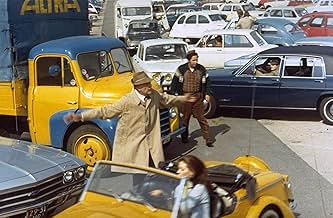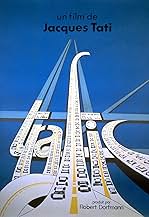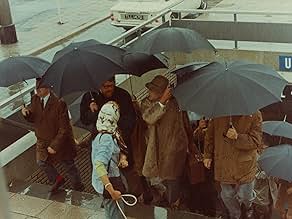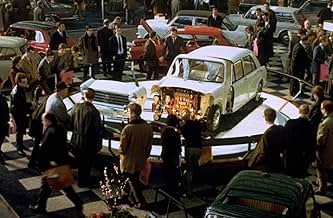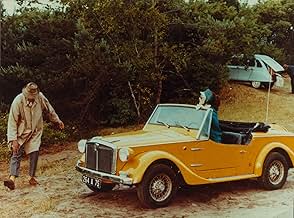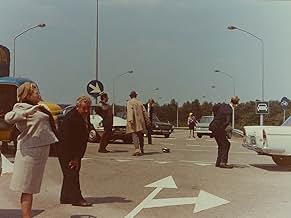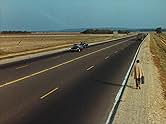VALUTAZIONE IMDb
7,0/10
8070
LA TUA VALUTAZIONE
Aggiungi una trama nella tua linguaMr. Hulot drives a recreational vehicle from Paris to Amsterdam in his usual comical, disastrous style.Mr. Hulot drives a recreational vehicle from Paris to Amsterdam in his usual comical, disastrous style.Mr. Hulot drives a recreational vehicle from Paris to Amsterdam in his usual comical, disastrous style.
- Regia
- Sceneggiatura
- Star
- Nominato ai 1 BAFTA Award
- 1 vittoria e 1 candidatura in totale
Jacques Tati
- Monsieur Hulot
- (as Mr. Hulot)
Honoré Bostel
- Director of ALTRA
- (as Honore Bostel)
François Maisongrosse
- François
- (as F. Maisongrosse)
Marco Zuanelli
- Mechanic
- (as Mario Zanuelli)
Recensioni in evidenza
8sol-
It takes about half an hour for this film to warm up, but once it gets going, it is a great watch. As the fourth entry in Tati's M. Hulot series, the film is not quite as good as the two previous entries, 'PlayTime' and 'Mon Oncle', but it is still a fine film on its own, with not only amusing puns but also interesting satirical elements once again. Like with the previous two films, 'Trafic''s jokes owe a lot to the way in which the shots are set up, and in general Tati does a fine job visualising the material. Some shots appear to lack meaning or thematic motivation, but in general they help to flesh out the humour at technology. It is also interesting how there is a distinct lack of close-ups until the end. Everything going on is so interesting that one wants to look closer, but Tati places the viewer at a distance. The jokes are often funnier because we cannot see the finer details, and this is perhaps Tati saying something in the way of that if we distance ourselves we can see humour that we might miss otherwise if we try to examine everything too closely. As usual, the music used is excellent too, fitting in well with the on-screen action. Overall, the film does not work quite as well as 'PlayTime' and 'Mon Oncle', but there is little reason to regard it as an inferior entry - just a lesser entry, perhaps.
'Trafic (1971)' - with one 'f' - isn't about drugs, it's about cars. More specifically, it's about the chaos of car travel, the mishaps and hiccups that occur when driving a metal box from one location to another. With a more clear narrative drive than its predecessors, Mr. Hulot's final outing sees its clumsy main character accompany a camping car he's designed to a trade show in Amsterdam. The perpetually pleasant protagonist actually has a job this time, and he's dedicated to doing it as well as he possibly can - which, of course, isn't as well as his employers would like. This mildly amusing comedy isn't particularly funny, but it has a handful of humourous moments and it's generally pleasant. It ambles about amiably, and it somehow never comes close to being boring despite the fact that its slow pacing emphasises the gaps between its giggles. Its ambition is scaled back when compared to 'Playtime (1967)' and it lacks that superior picture's truly scrumptious production design, but it's more compelling - and chucklesome - than 'Monsieur Hulot's Holiday (1953)' and 'Mon Oncle (1958)'. It isn't brilliant, but it's enjoyable enough for what it is. It's a very specific sort of experience, one almost exclusive to its series. Personally, this type of film is hit or miss for me. Now I've seen all of Hulot's outings, I can safely say I actively enjoyed two of them. However, I can see how some people would enjoy them all, and to a much higher degree than I do. This final Hulot film is well-made, charming and fairly amusing. It's a bit of an odd coda to 'Playtime (1967)', which is considered a masterpiece by many, but it's a solid effort nevertheless.
Tati's final theatrical film, which is often considered his greatest failure, is in actuality nearly as good as his masterpieces. In this film, Tati stars for the fourth and final time as M. Hulot. This time he has a job as an automobile designer, and it is his job to get his company's new Camping Car to Amsterdam for a big auto show. Accompanying him is a driver, François, and a public relations worker, Maria (played marvelously by Maria Kimberly, who reminds us of the great lead actress roles played by Nathalie Pascaud and Barbara Denneck in M. Hulot's Holiday and Playtime respectively). Maria drives around in a little yellow convertible with her little fur-ball dog. Its fast and maneuverable. It can go pretty much anywhere it wants. Unfortunately, François and M. Hulot are driving a large truck. They often get into trouble when they're trying to follow Maria's car. Every problem that can happen does. Many observations are made about how people act when they're in their cars on the highway (it's a non-stop traffic jam from Paris to Amsterdam). The jokes in Traffic are always hilarious. The first fifteen or twenty minutes are somewhat dry of them, which is mainly why I don't rank this one up there with M. Hulot's Holiday, Mon Oncle, and Playtime (it's about even with Jour de fête). But when it gets going, it never stops. And it's beautiful, too, just as all of his other films. The final sequence is sublime, and the final shot will stay with me forever. 9/10.
This really is not unpleasant, and I smiled a good deal (when I wasnt bored); but an hour in I knew I wouldn't watch this again after this viewing most likely, which is not the case with Tati's other Hulot films that are pretty masterful on the whole (think like, say, going from A Night at the Opera to Room Service with the Marx brothers and you may catch my drift).
Tati is so into having little bits of business that the movie often forgets to have... gags. Or, that is not always fair, perhaps it thinks the little bits of behavior are enough to sustain it, but without things like relatable characters it feels aloof. And while the whole overall irony is that they actually don't get to the auto show in Amsterdam due to the mishaps and ballyhoo, I suspect there would have been some rich chances for more satisfying plants and payoffs, or quick visuals (Hulot in the half-car is a hoot), than what we get with the misadventures and long stays at the office (to show how the camping car works) and at the farmhouse.
The multi-car nose picking (but not one booger eaten, come on, France), the multi-car melee (especially that one car's hood flapping away) and Hulot getting stuck up in the tree upside down trying his damndest to fix the outside hedge fixture on the house are the highlights and are funny. And there are little bits of grace notes that made me laugh a bit, like when Hulot steps into the guys office, turns around and knocks, the man at the desk says to come in, then he leaves and talks to the man at the other desk he just passed (!) Or the moment where that one barking dog in the countryside house is just a big softee.
Dare I say, as admirable as the effort is, Tati (on a post Playtime high) is a little too satisfied with his own flights of fancy. I think the problem too is not that a filmmaker is engaged more with behavior than story or plot - what would cinema be without Altman or Cassavetes if that was the case - but the larger context and people in it need to matter for that behavior to take shape, and this features... a slightly bumbling but not more or less than usual Hulot, and that one American woman (director of ALTRA, she doesn't even have a name), who seems stuffy and not that sympathetic for much of the time. I know, I know: tragedy in close up and comedy in long shot and so on, but there are limits.
Ok, one more nice part: The images of the cars driving fast and the chaos of the last ten minutes set to Charles Dumont's burst of rock and roll.
Tati is so into having little bits of business that the movie often forgets to have... gags. Or, that is not always fair, perhaps it thinks the little bits of behavior are enough to sustain it, but without things like relatable characters it feels aloof. And while the whole overall irony is that they actually don't get to the auto show in Amsterdam due to the mishaps and ballyhoo, I suspect there would have been some rich chances for more satisfying plants and payoffs, or quick visuals (Hulot in the half-car is a hoot), than what we get with the misadventures and long stays at the office (to show how the camping car works) and at the farmhouse.
The multi-car nose picking (but not one booger eaten, come on, France), the multi-car melee (especially that one car's hood flapping away) and Hulot getting stuck up in the tree upside down trying his damndest to fix the outside hedge fixture on the house are the highlights and are funny. And there are little bits of grace notes that made me laugh a bit, like when Hulot steps into the guys office, turns around and knocks, the man at the desk says to come in, then he leaves and talks to the man at the other desk he just passed (!) Or the moment where that one barking dog in the countryside house is just a big softee.
Dare I say, as admirable as the effort is, Tati (on a post Playtime high) is a little too satisfied with his own flights of fancy. I think the problem too is not that a filmmaker is engaged more with behavior than story or plot - what would cinema be without Altman or Cassavetes if that was the case - but the larger context and people in it need to matter for that behavior to take shape, and this features... a slightly bumbling but not more or less than usual Hulot, and that one American woman (director of ALTRA, she doesn't even have a name), who seems stuffy and not that sympathetic for much of the time. I know, I know: tragedy in close up and comedy in long shot and so on, but there are limits.
Ok, one more nice part: The images of the cars driving fast and the chaos of the last ten minutes set to Charles Dumont's burst of rock and roll.
Despite bearing the opening declaration 'M. Hulot dans', everybody's favourite Frenchman again has a tendency to wander in and out of action rather perfunctorily executed; although he manages to be much more in evidence than his earlier 'PlayTime'
It was only a matter of time before Jacques Tati tackled humanity's eternal nemesis - the motor car - in a film that gives a new meaning to the term 'road movie'.
First we see them assembled on a production line before being unleashed upon a hapless public - all to the accompaniment of a deceptively jaunty score.
A couple of the sight gags are genuinely funny, but one tends to view the proceedings with interest rather than involvement.
It was only a matter of time before Jacques Tati tackled humanity's eternal nemesis - the motor car - in a film that gives a new meaning to the term 'road movie'.
First we see them assembled on a production line before being unleashed upon a hapless public - all to the accompaniment of a deceptively jaunty score.
A couple of the sight gags are genuinely funny, but one tends to view the proceedings with interest rather than involvement.
Lo sapevi?
- QuizThe end scene (people walking with umbrellas between parked cars) was shot on the parking lot of the then still functioning Amsterdam Ford factory.
- BlooperSeveral (Dutch) license plates can be seen on various different vehicles, sometimes even in the same shot. For instance the license plate "FT-92-65" can be seen in the petrol station scene on both a Peugeot 504 and a Chrysler 180. Later the same plate is on a Peugeot 204 passing in front of the exhibition center. In the "road rage" scene the number 76-04-NF is on both the Renault 16 and the Citroën ID. Shortly after the same plate is on an Opel Kadett parked in front of the exhibition center.
- Citazioni
Radio Announcer: The Cyclone 70. A new raincoat... especially made for the sun.
- Curiosità sui creditiIn the opening credits, Tati is billed simply as "M. Hulot." He does, of course, use his real name for his writing and directing credits.
- ConnessioniFeatured in Omnibus: Monsieur Hulot's Work (1976)
I più visti
Accedi per valutare e creare un elenco di titoli salvati per ottenere consigli personalizzati
- How long is Traffic?Powered by Alexa
Dettagli
- Data di uscita
- Paesi di origine
- Sito ufficiale
- Lingue
- Celebre anche come
- Traffic
- Luoghi delle riprese
- Aziende produttrici
- Vedi altri crediti dell’azienda su IMDbPro
Botteghino
- Lordo in tutto il mondo
- 51.348 USD
- Tempo di esecuzione
- 1h 36min(96 min)
- Mix di suoni
- Proporzioni
- 1.37 : 1
Contribuisci a questa pagina
Suggerisci una modifica o aggiungi i contenuti mancanti

